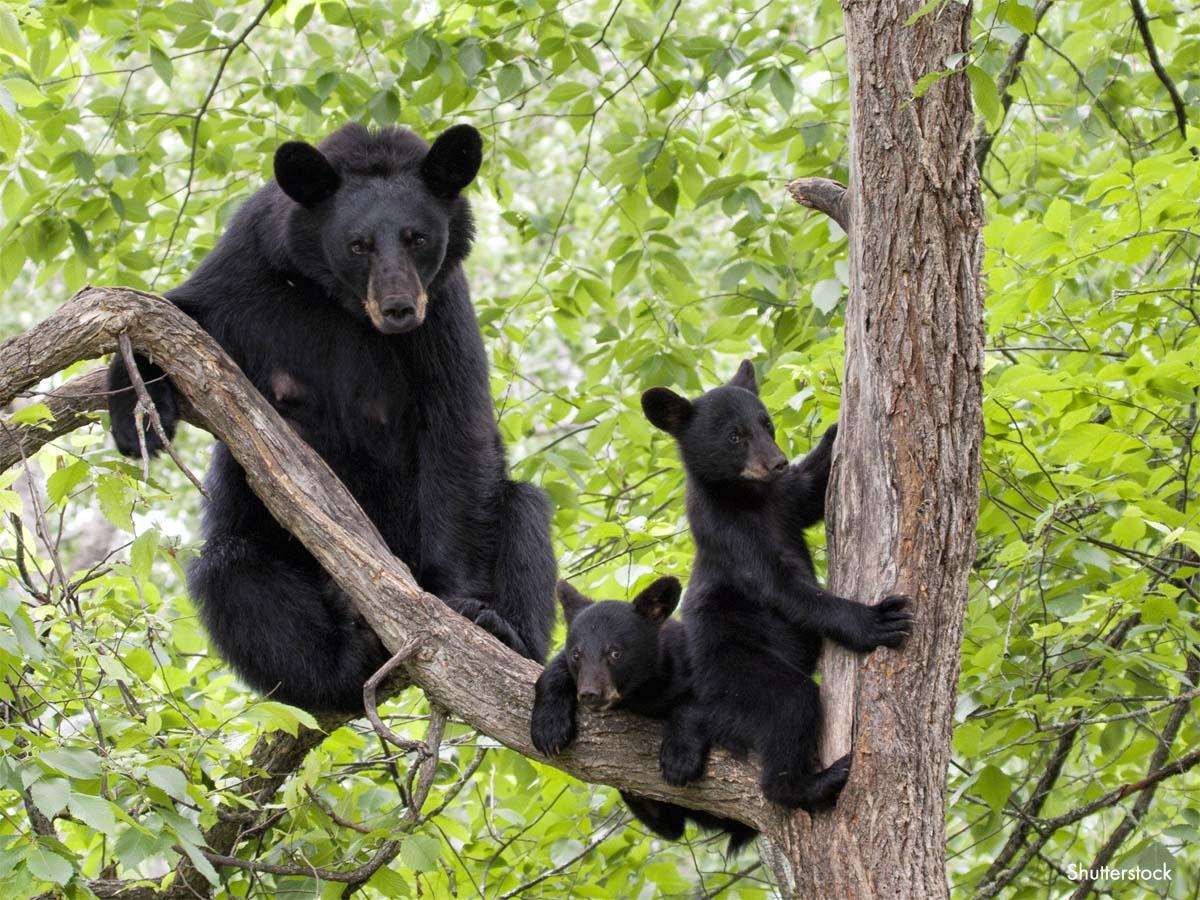Celebrate America’s Most Iconic Animal on National Black Bear Day!
The first Saturday in June is National Black Bear Day, which means that this weekend is the perfect time to celebrate and learn more about one of North America’s most iconic animals!
Black bears are playful, curious, and shy animals who do not seek out and may actively avoid human interaction. They are approximately five to seven feet tall when standing on their hind legs and weigh between 200-600 pounds. Despite their name, black bears can vary in color and may have white markings on their chest known as a chest blaze. They may be referred to as “cinnamon bears” due to the appearance of brownish fur.
Black bears are omnivores and enjoy large amounts of fruits, nuts, seeds, and other food sources during the late summer and early fall months to fatten up before winter hibernation. These incredible animals also can control their reproduction based on their environment. Excess fat storage allows bears to survive during the winter months, and it also plays a role in bears’ reproduction. When food and resources are plentiful in a bear’s habitat, females will have optimal fat storage on their bodies. This indicates that the bear is healthy and that the habitat has enough resources to provide for future offspring. Fertilized eggs will implant themselves in the healthy mother’s womb to give birth to cubs. If a female does not have adequate fat storage, this indicates an unsuitable habitat with too few resources, and fertilized eggs will not implant, resulting in no offspring.
Cubs are born blind, toothless, and with all of their fur. They stay with their mother for 16 months and then leave home to establish their home ranges. Although they are considered solitary animals, they tolerate and may interact with and share resources with other black bears in the same general areas. Males and females seek out potential mates during the spring and summer months. They can live 20 years in the wild.
Black bears have a keen sense of smell that attracts them to areas with food or food waste that humans have left behind. They are typically active during the daytime; however, they may become nocturnal to avoid humans and seek out food at night. Although they do not normally show aggression, it is important to remember that black bears are wild animals who can cause injury when provoked. They do not want to interact with humans and simply want to survive in their homes. The presence of food brought into their ranges by humans causes unwanted encounters and potentially deadly consequences for the bears, who may be killed or injured by scared and uninformed humans.
To keep black bears away from residential areas, simple precautions can be taken. Secure all trash in stationary, locked bins and avoid keeping trash outdoors overnight. Do not keep bird feeders or dog or cat food outdoors, and make sure to thoroughly clean any grills immediately after use.
Here’s what might happen when you don’t have trash securely stowed in an area with black bears.
If you find yourself within close proximity of a black bear, make sure you do not startle or corner them. If traveling with small animal companions or young children, pick them up immediately. You must give the bear an escape route so they may retreat. Do not run and do not make any sudden movements. Speak in a loud, low-pitched tone and move your arms above your head, so the bear recognizes you as a human and does not mistake you for prey. Make your body appear as large as possible and tell the bear to leave the area. Do not attempt to make animal sounds or high-pitched squeals. If the bear is not moving toward you, walk sideways away from the bear at a slow place while keeping the bear in your sight. You should not attempt to climb a tree as they are excellent climbers; however, seeking higher ground to appear larger than the bear is recommended.
If a black bear starts to approach you, scream loudly, flail your arms, and do what you can to scare them off. If the situation escalates and a bear feels scared and threatened enough to attack, do not play dead. Use whatever resources you have to strike the bear in the face area, allowing both you and the bear the opportunity to make it out of the situation alive.
Remember, black bears do not want to interact with you. They simply want food. Avoid bringing food with you when you’re in an area known to have black bears. If you decide to bring food, make sure to dispose of all traces of food waste properly. Sadly, this waste remains in the area and attracts bears even after you have left, causing danger for other bears and humans.
Learn more about having safe encounters with all types of bears, especially when hiking with dogs. Knowing this information could save your life, the lives of your animal companions, and those of any wild bears you encounter.
If you live in North Carolina and have not yet taken action on our alert to protect bears in bear sanctuaries, please call and sign now. Since the publishing of this alert, we have some exciting news to report.
Please consider making a donation so we can continue to protect black bears and their habitats!


